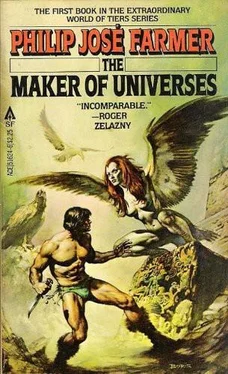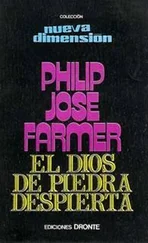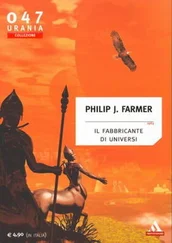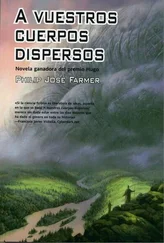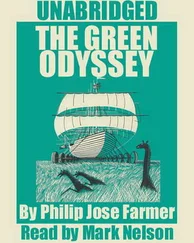Kickaha looked long before saying, “The Tsenakwa. The mortal enemy of the Bear People, as who isn’t?”
“Here they come,” Wolff said. “They must have been notified by sentinels.”
He gestured at a disorganized body of horsemen riding out of the woods, the sun striking off white horses, while shields, and white feathers and sparking the tips of lance.
One of the Hrowakas, seeing them, began a highpitched wailing song. Kickaha shouted at him, and Wolff understood enough to know that Kickaha was telling him to shut up. Now was no time for a deathsong; they would cheat the Half-Horse and the Tsenakwa yet.
“I was going to order our last stand here,” Kickaha said. “But not now. We’ll ride toward the Tsenakwa, then cut away from them and toward the woods along the river. How we come out depends on whether or not both our enemies decide to fight. If one refuses, the other will get us. If not... Let’s go!”
Haiyeeing, they pounded their heels against the ribs of their beasts. Down the hill, straight toward the Tsenakwa, they rode. Wolff glanced back over his shoulder and saw that the Half-Horse were speeding down the side of the hill after them. Kickaha yelled, “I didn’t think they’d pass this up. There’ll be a lot of women wailing in the lodges tonight, but it won’t be only among the Bear People!”
Now the Hrowakas were close enough to discern the devices on the shields of the Tsenakwa. These were black swastikas, a symbol Wolff was not surprised to see. The crooked cross was ancient and widespread on Earth; it was known by the Trojans, Cretans, Romans, Celts, Norse, Indian Buddhists and Brahmans, the Chinese, and throughout preColumbian North America. Nor was he surprised to see that the oncoming Indians were red-haired. Kickaha had told him that the Tsenakwa dyed their black locks.
Still in an unordered mass but now bunched more closely together, the Tsenakwa leveled their lances and gave their charge-cry, an imitation of the scream of a hawk. Kickaha, in the lead, raised his hand, held it for a moment, then chopped it downward. His horse veered to the left and away, the line of the Bear people following him, he the head and the others the body of the snake.
Kickaha had cut it close, but he had used correct and exact timing. As the Half-Horse and Tsenakwa plunged with a crash and flurry into each other and were embroiled in a melee, the Hrowakas pulled away. They gained the woods, slowed to go through the trees and underbrush, and then were crossing the river. Even so, Kickaha had to argue with several of the braves. These wanted to sneak back across the river and raid the tepees of the Tsenakwa while their warriors were occupied with the Half-Horse.
“Makes sense to me,” Wolff said, “if we stay there only long enough to pick up horses. Hums Like A Bee and Tall Grass can’t keep on riding double.”
Kickaha shrugged and gave the order. The raid took five minutes. The Hrowakas recrossed the river and burst from the trees and among the tepees with wild shouts. The women and children screamed and took refuge in the trees or lodges. Some of the Hrowakas wanted not only the horses but loot. Kickaha said that he would kill the first man he caught stealing anything besides bows and arrows. But he did reach down off his horse and give a pretty but battling woman a long kiss.
“Tell your men I would have taken you to bed and made you forever after dissatisfied with the puny ones of your tribe!” Kickaha said to her. “But we have more important things to do!” Laughing, he released the woman, who ran into her lodge. He did pause long enough to make water into the big cooking pot in the middle of the camp, a deadly insult, and then he ordered the party to ride off.
They rode on for two weeks and then were at the edge of the Trees of Many Shadows. Here Kickaha took a long farewell of the Hrowakas. These also each came to Wolff and, laying their hands upon his shoulders, made a farewell speech. He was one of them now. When he returned, he should take a house and wife among them and ride out on hunts and war with them. He was KwashingDa, the Strong One; he had made his kill side by side with them; he had outwrestled a Half-Horse; he would be given a bear cub to raise as his own; he would be blessed by the Lord and have sons and daughters, and so forth and so on.
Gravely, Wolff replied that he could think of no greater honor than to be accepted by the Bear People. He meant it.
Many days later, they had passed through the Many Shadows. They lost both horses one night to something that left footprints ten times as large as a man’s, and four-toed. Wolff was both saddened and enraged, for he had a great affection for his animal. He wanted to pursue the WaGanassit and take vengeance. Kickaha threw his hands up in horror at the suggestion.
“Be happy you weren’t carried off, too!” he said.
“The WaGanassit is covered with scales that are half-silicon. Your arrows would bounce off. Forget about the horses. We can come back someday and hunt it down. They can be trapped and then roasted in a fire, which I’d like to do, but we have to be practical. Let’s go.”
On the other side of the Many Shadows, they built a canoe and went down a broad river that passed through many large and small lakes. The country was hilly here, with steep cliffs at many places. It reminded Wolff of the dells of Wisconsin.
“Beautiful land, but the Chacopewachi and the Enwaddit live here.”
Thirteen days later, during which they had had to paddle furiously three times to escape pursuing canoes of warriors, they left the canoe. Having crossed a broad and high range of hills, mostly at night, they came to a great lake. Again they built a canoe and set out across the waters. Five days of paddling brought them to the base of the monolith, Abharhploonta. They began their slow ascent, as dangerous as that up the first monolith. By the time they reached the top, they had expended their supply of arrows and were suffering several nasty wounds.
“You can see why traffic between the tiers is limited,” Kickaha said. “In the first place, the Lord has forbidden it. However, that doesn’t keep the irreverent and adventurous, nor the trader, from attempting it.
“Between the rim and Dracheland is several thousand miles of jungle with large plateaus interspersed here and there. The Guzirit River is only a hundred miles away. We’ll go there and look for passage on a riverboat.”
They prepared flint tips and shafts for arrows. Wolff killed a tapirlike animal. Its flesh was a little rank, but it filled their bellies with strength. He wanted then to push on, finding Kickaha’s reluctance aggravating. Kickaha looked up into the green sky and said, “I was hoping one of Podarge’s pets would find us and have news for us. After all, we don’t know which direction the gworl are taking. They have to go toward the mountain, but they could take two paths. They could go all the way through the jungle, a route not recommended for safety. Or they could take a boat down the Guzirit. That has its dangers, too, especially for rather outstanding creatures like the gworl. And Chryseis would bring a high price in the slave market.”
“We can’t wait forever for an eagle,” Wolff said.
“No, nor will we have to,” Kickaha said. He pointed up, and Wolff, following the direction of his fingertip, saw a flash of yellow. It disappeared, only to come into view a moment later. The eagle was dropping swiftly, wings folded. Shortly, it checked its drop and glided in.
Phthie introduced herself and immediately thereafter said that she carried good news. She had spotted the gworl and the woman, Chryseis, only four hundred miles ahead of them. They had taken passage on a merchant boat and were traveling down the Guzirit toward the Land of Armored Men.
Читать дальше
